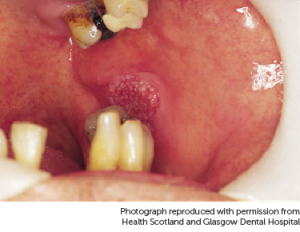This page will go through –
-
What mouth, head and neck cancer is
-
What are the risk factors
-
What are the symptoms
-
How to reduce your risk
-
How MHNC is diagnosed
-
Treatment Types
What is mouth, head and neck cancer?
Mouth, head and neck cancer (MHNC) is cancer found in the tissues of the mouth, head and neck. This includes all of the following:

- Mouth Cancer – lips, tongue, gums, cheeks, the roof of mouth and floor of the mouth
- Oropharyngeal Cancer – back and sides of the throat and the base of the tongue
- Nose Cancer – nasopharynx (the area where the throat joins the nose), nostrils or the lining of the nose
- Ear Cancer – in and around the ear
- Eye Cancer – thought this is a very rare form of mouth, head and neck cancer.
- Salivary Gland Cancer- cancer cells found in the salivary glands in the mouth. Benign lumps in the salivary glands are common but need to be checked out
- Laryngeal (larynx, also known as the voice box). This cancer is not as common as the above but is still something that you should monitor
- Thyroid Cancer- this can occur as a lower midline neck swelling
- Cancer can also develop in the bones around the face or in sinuses
Over 700 cases of Mouth, Head and Neck cancer are diagnosed in Ireland each year. Mouth, Head and Neck cancer is the 6th most common cancer worldwide with an estimated 550,000 cases diagnosed annually. It mainly affects men and older people, however, the number of women and younger people being diagnosed is rising. MHNC rates have been rising both in Ireland and in most EU countries for the past few years. Early detection greatly improves your chances of successful treatment.
What are the risk factors for Mouth, Head and Neck Cancer?
Certain factors are known to increase your risk of developing Mouth, Head and Neck cancer. Some of these factors are-
- Smoking- cigarettes, cigars, pipes or marijuana
 Chewing- Chewing smokeless tobacco, paan, gutka or quid
Chewing- Chewing smokeless tobacco, paan, gutka or quid- Alcohol – Drinking alcohol and products containing alcohol
- Overexposure – Too much time in the sun and the use of sunbeds (lip cancer)
- Gender – Mouth head and neck cancers are more common in men than in women
- Diet- A diet lacking in fruit and vegetables may increase the risk of cancer.
- HPV: HPV stands for ‘human papillomavirus’, which is a group of more than 100 viruses. HPV is very common – most people will be infected with a form of HPV in their lifetime. HPV infection is most common in people in their late teens and early 20s.You can catch HPV by being sexually active with another person who already has the virus. Most HPV infections do not need treatment because your body can clear the virus itself. But in some people, the HPV infection can develop into cancer or genital warts. (visit hpv.ie for further information).Many cases of MHNC in the last few years have been linked to the HPV virus. HPV infection can be spread through oral sex and can cause cancer of the throat and tonsil in both men and in women. Click to learn more about HPV and it’s vaccine.
What are the symptoms of mouth, head and neck cancer?
The symptoms depend on where the cancer is in the head or neck.
 Symptoms for mouth cancer may include –
Symptoms for mouth cancer may include –
- A sore or ulcer in the mouth that does not heal
- White or red patches inside the mouth that don’t go away
- A lump in the mouth or neck area
- Discomfort or pain in the mouth that doesn’t go away.
- Difficulty or pain with chewing, swallowing, speaking or moving the tongue
- Unexplained loose teeth for no obvious reason or badly fitting dentures
- Thickening or hardening of the cheek or tongue
- Bad breath (halitosis)
Symptoms for head and neck cancer may include-

- Numbness of the tongue or face
- Persistent sore throat or hoarseness
- Bleeding in the mouth or nose bleeds
- Unexplained weight loss over a short time
- A blocked nose that doesn’t get better
- Earache, changes in hearing or ringing in the ears (tinnitus)
- Drooping on one side of the face (facial palsy)
Check your mouth regularly. If you have any of these symptoms for more than 3 weeks have them checked out by your doctor or your dentist.
Reducing your risk of Mouth, Head and Neck Cancer:
- Get to know your mouth – Check your mouth regularly so you can recognise new changes in your mouth and gums
- Don’t smoke – The most important thing you can do to reduce your risk of these cancers is to stop smoking. Contact the National Smokers Quitline for support- Freephone 1800 201 203, Freetext QUIT to 50100 or visit quit.ie for help and advice.
- Drink less alcohol – if you drink alcohol, stay within the low-risk alcohol guidelines: no more than 17 standard drinks for a man or 11 standard drinks for a woman, spread out over the week. Have 2-3 alcohol-free days. Remember these are a guide, not a target. Don’t binge drink
- Be SunSmart– Use sunscreen with SPF 30 or higher and with the 5 star UVA rating or/and UVA inside a circle on areas that are exposed to the sun, like your face and hands. Wear a lip balm that contains sunblock.
- Go to your dentist – Visit your dentist every year even if you do not have any remaining Follow the steps below and be sure to check your mouth on a regular basis.
One of the easiest ways to monitor your health generally is by getting to know your own body. Being able to recognise changes and irregularities that are new for you is the first step in your recovery journey. And your mouth is no different. Be mouth aware with these 6 simple steps:
Stand in front of a mirror with good light and look inside your mouth for any new changes. Gently feel all-around your mouth
- Check your gums and inside the bottom and top lips
- Check inside the cheeks – right and left sides
- Open your mouth and look at the roof of your mouth and the tonsils at the back of your mouth
- Stick out your tongue and check it: top and both sides, right and left (use a tissue to hold slippery tip)
- Lift your tongue to the roof of your mouth and use your finger to feel the floor of your mouth underneath and at each side of the tongue.
- Check your lips and finally, feel your neck for recent changes.
For more information on how to properly check your mouth, visit the Mouth Cancer Awareness day website.
If you notice any new changes like an ulcer, white patch, or feel a hard lump, take this seriously and get advice from your dentist or GP. Talk to your doctor or dentist also if you notice anything unusual, such as pain, unusual bleeding or new symptoms that don’t clear up after three weeks.
How is mouth, head and neck cancer diagnosed?
If you have any symptoms which haven’t gone away after 3 weeks visit your GP or dentist. If necessary, your doctor or dentist will arrange for you to be seen by an ear, nose and throat (ENT) specialist or other specialists. Your G.P. or dentist will decide on which Specialist you should be referred to. Depending on your symptoms and other factors, this might be an urgent referral.
The specialist will ask you about the symptoms you have been experiencing, as well as any health conditions or recent illnesses. They will examine you, and might arrange one or more of the following tests.
A biopsy – a sample of cells or tissue from the lump or area that looks abnormal which are then sent to a lab to be analysed. This may be a punch biopsy or fine needle biopsy.
- A punch biopsy may be used if the suspected affected area of tissue is in an easily accessible place, such as your tongue or the inside of your mouth. The area is first injected with a local anaesthetic to numb it. The doctor will then cut away a small section of affected tissue and remove it with tweezers. The procedure is not painful but can feel a little uncomfortable
- A fine-needle aspiration (FNA) is a type of biopsy that can be used if it is suspected that swelling in your neck is the result of mouth cancer. During an FNA, the doctor will insert a sharp needle into the lump and draw out a small sample of tissue and fluids. The sample is then checked for cancerous cells. A local anaesthetic is used to numb your neck, so an FNA is not painful. However, it can be uncomfortable and you may have some bruising after the procedure.
An ultrasound scan of the neck– This quick and painless test uses soundwaves to produce a picture of your neck and lymph nodes on a screen. The doctor will put gel on to your neck and pass a small device over the area to look for any changes in the size or appearance of the lymph nodes.
A nasendoscopy – a thin, flexible tube with a light at the end that is passed up the nose and into the throat
Examination under anaesthetic (EUA) – examination under a general anaesthetic where a thin tube is passed down the throat to examine it and to take a biopsy
A trans-nasal flexible laryngo-oesophagoscopy (TNFLO) – if a general anaesthetic is not possible, a thin tube is passed up the nose and into the throat to look at this area and the oesophagus
Other types of tests used in diagnosing mouth, head and neck cancers include X-rays, CT scans, MRI scans, and PET scans. These tests are primarily done to stage the cancer. Stage means how big the cancer is, and whether it has spread to another part of the body. Knowing the stage helps your doctor decide the best treatment for you. The most common place for mouth or oropharyngeal cancer to spread is the lymph nodes in the neck.
Treatment for head and neck cancer
A team of doctors and other professionals discuss the best treatment and care for you. They are called a multidisciplinary team (MDT). An MDT may include different specialists such as surgeons, dentists, pathologists, raiologists and a social worker.
You may also be assigned a clinical nurse specialist (CNS) who specialises in the treatment of mouth cancer. The CNS will be your first point of contact between you and the members of the MDT. The CNS will provide information and advice about your treatment plan and the various support services available.
The treatment you have depends on:
- where your cancer is
- how far it has grown or spread (the stage)
- the type of cancer
- how abnormal the cells look under a microscope (the grade)
- your general health and level of fitness
Early-stage mouth, head and neck cancer is usually treated with either surgery or radiotherapy.
Before treatment begins
Before treatment for mouth cancer begins, you will be given a full dental examination and any necessary dental work will need to be carried out. The radiotherapy will make your teeth more sensitive and vulnerable to infection, so it is important to have a good level of dental hygiene before treatment begins.
A hygienist can also give you advice on how to maintain good dental hygiene. If you are smoking and drinking alcohol, it is recommended that you stop, as quitting will increase the chances of your treatment being successful. Ask your doctor for advice on quitting smoking or cutting out alcohol.
Types of treatment
If a mouth, head or neck cancer is larger or has spread to lymph nodes in the neck, you may need more than one type of treatment. These treatments may include:
- Surgery – Surgery is a common treatment for early-stage mouth, head and neck cancer. The type and extent of surgery you require all depends on the size and location of your cancer. You are most likely to have an operation under general anaesthetic
- Chemotherapy – You may require chemotherapy if your cancer has spread into surrounding area or to other parts of the body. This can also be the case if a previous cancer diagnosis has returned. Sometimes you can have it before treatments (such as radiotherapy) or after other treatments
- Radiotherapy – You can have radiotherapy alone or together with chemotherapy. Radiotherapy alone is a treatment for some types of mouth, head and neck cancer that has not spread. You may also have radiotherapy after surgery. This is to kill any cancer cells that might have been left behind. It lowers the risk of the cancer coming back.
- Chemoradiotherapy – This is chemotherapy and radiotherapy together. You may have chemoradiotherapy instead of surgery if your cancer has spread into surrounding tissues or into nearby lymph nodes. For some people, this may get rid of cancer completely.
- Targeted cancer therapy – You might have targeted or immunotherapy cancer drugs. Targeted cancer drugs work by ‘targeting’ those differences that help a cancer cell to grow and survive. Some seek out and destroy cancer cells. Others help the body’s immune system to attack the cancer. So some of these drugs are also called immunotherapies
Helpful Resources:
Videos: Meet the Cancer Care Team (theihns.com)
To download a copy of our Mouth, Head and Neck cancer infographic, click here.
To read and download a free copy of our Mouth, Head and Neck cancer information leaflet, click here.
If you are going through Mouth, Head or Neck cancer and need support, the list below may be able to help.
National Quit Hotline – 1800 201 203
Alcohol Action Ireland – 01-878 0610
Dublin Dental University Hospital – 01-612 7391
Cork University Dental School and Hospital– 021-490 1100
Mouth Cancer Foundation – www.mouthcancerfoundation.org
Dental Health Foundation – 01-672 8870
Irish Dental Association – 01-295 0072
Mouth Cancer Awareness Day Page –
For more support and advice, see the list of Cancer Support Centres on out website for a centre in your area.

